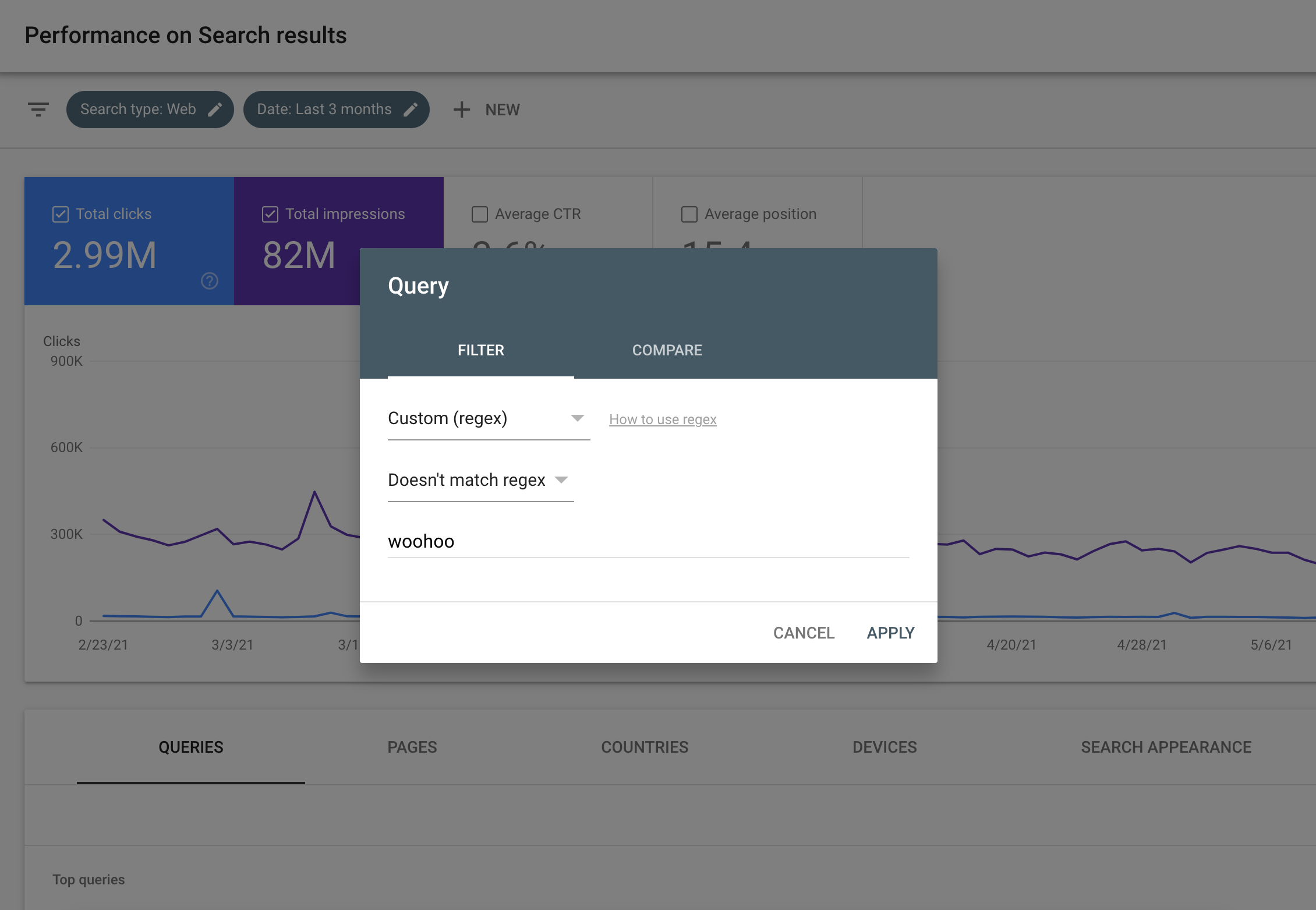Среда, 2 июня 2021 г.
Недавно мы представили новые возможности фильтрации в отчетах об эффективности Search Console и были рады ответной реакции сообщества.
Как и всегда, нам были очень интересны ваши отзывы, среди которых было немало просьб доработать отчет, добавив в фильтр регулярных выражений возможность указывать отрицательные соответствия.
Рады сообщить, что с сегодняшнего дня отчет об эффективности поддерживает фильтры регулярных выражений как с совпадением, так и с несовпадением. Этот вариант доступен в дополнительном меню, которое появится, если в списке выбрать фильтр "Специальные запросы (регулярные выражения)", как показано на приведенном ниже скриншоте. Подробнее о фильтрации данных по эффективности поиска…

Советы по использованию регулярных выражений в Search Console
Мы посчитали полезным дать несколько советов, если вы только знакомитесь с регулярными выражениями.
Для начала нужно понять, что представляют собой регулярные выражения. Это специальные последовательности символов, задающие шаблон для поиска. Благодаря им вы можете создавать более сложные фильтры, включающие не только конкретные слова и фразы. В основе регулярных выражений лежат метасимволы – символы со специальным значением, задающие определенные критерии поиска. Более поддробную информацию обо всех метасимволах, которые поддерживаются в Search Console, можно найти в справочнике по синтаксису регулярных выражений RE2.
Вот несколько примеров, которые помогут понять, в каких случаях лучше использовать регулярные выражения.
- Сегментация пользователей, которые уже знакомы с вашим брендом. Выполните поиск по различным вариантам названия вашей компании, в том числе с опечатками. Так вы узнаете, какие типы запросов отправляет та или иная группа и какую именно аудиторию привлекает тот или иной раздел вашего сайта.
Например, если ваша компания называется
Willow Tree, то можно создать фильтр, который будет включать все возможные варианты:willow tree|wilow tree|willowtree|willowtee(здесь|– метасимвол, соответствующий логическому оператору ИЛИ). - Анализ посещаемости разделов сайта. Используйте регулярные выражения, соответствующие определенным каталогам сайта, чтобы выявить наиболее распространенные запросы по каждому фрагменту вашего контента. Например, если ваш URL выглядит как
example.com/[product]/[brand]/[size]/[color]и вы хотите оценить популярность зеленых туфель независимо от их бренда или размера, можно воспользоваться регулярным выражениемshoes/.*/green(здесь.*соответствует произвольной последовательности символов). - Определение намерений пользователей. С помощью регулярных выражений можно проанализировать, какие запросы приводят пользователей в те или иные разделы вашего сайта.
Например, c помощью фильтра с вопросительными словами
what|how|when|why, можно выделить разделы, в которых пользователи находят ответы на свои вопросы. Ещё один пример определения намерений — фильтр для поиска запросов, содержащих слова, связанные с покупкой, напримерbuy|purchase|order(или запросов, в которых нет этих слов). Вы также можете узнать, названия каких товаров чаще встречаются в сочетании с этими словами.
Распространенные регулярные выражения можно найти в справочном центре Search Console. Если у вас есть интересные примеры использования регулярных выражений, поделитесь ими в Твиттере с хештегом #performanceregex.
Задать нам вопросы и оставить комментарии вы можете на справочном форуме Центра Google Поиска или в Твиттере.
